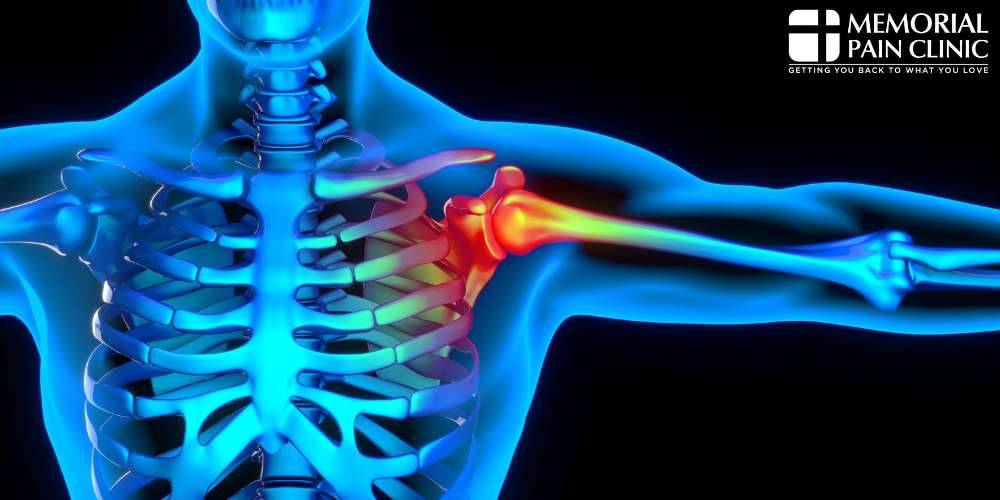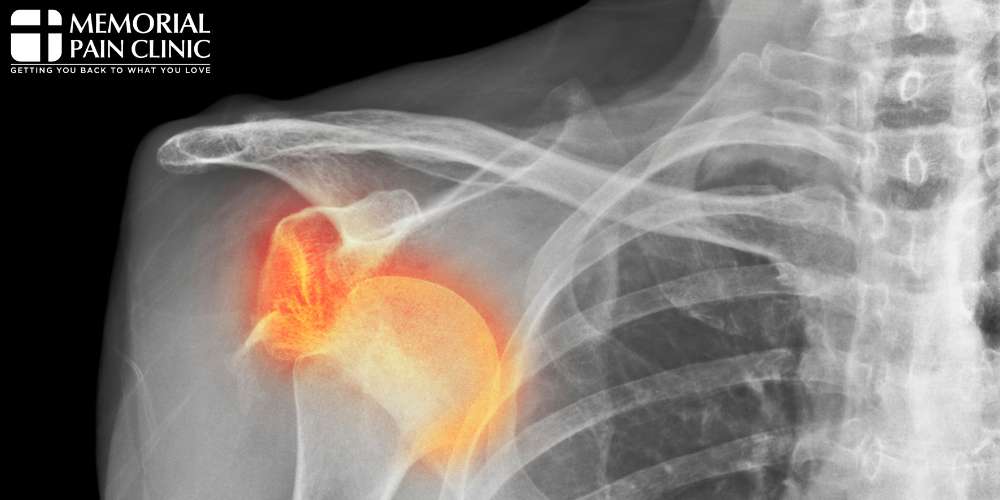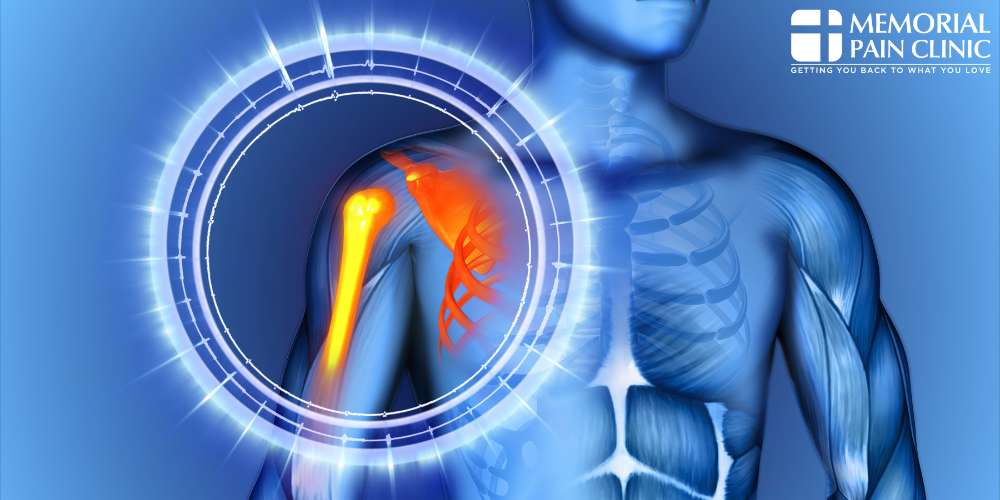Shoulder Pain Treatment Tulsa, OK
Our Services

If you’re struggling with persistent shoulder pain and seeking effective relief in Tulsa, OK, look no further than Memorial Pain Clinic. Our dedicated team of pain management specialists understands the profound impact shoulder pain can have on your daily life, from limiting your mobility to causing constant pain.
At Memorial Pain Clinic, we offer personalized treatment plans tailored to address the root cause of your pain, utilizing the latest non-surgical and minimally invasive techniques to help you regain your strength and restore your quality of life. Don’t let shoulder pain hold you back any longer—contact Memorial Pain Clinic today to start your journey toward pain-free living.
To schedule an appointment with one of our skilled and compassionate providers, please call our office at 918-200-9944 today.
Shoulder Anatomy
The shoulder is a complex ball-and-socket joint with several key structures. At its core is the shoulder blade, or scapula, which provides a foundation for the attachment of muscles and tendons, as well as movement. It articulates with the upper arm bone, known as the humerus, forming the main joint of the shoulder.
Surrounding this joint is the rotator cuff, a group of muscles and tendons that stabilize and facilitate the shoulder’s wide range of motion. Together, these components enable the shoulder to perform intricate movements, from lifting and rotating the arm to more intricate actions like reaching overhead or behind the body.
What Is Shoulder Pain?
Shoulder pain is a common issue that can result from a variety of causes, including injury, overuse, or underlying medical conditions. It can range from a mild discomfort to severe pain that significantly impacts daily activities and mobility. This pain may originate from structures such as muscles, tendons, ligaments, or bones within the shoulder joint, often involving the rotator cuff.
In severe cases, shoulder pain can hinder the ability to perform even simple tasks, necessitating medical evaluation and treatment to address the underlying cause and alleviate discomfort.
Shoulder Joint Injury Symptoms
Shoulder joint injuries and conditions can present a range of symptoms, varying in intensity based on the nature and severity of the injury. Some common symptoms include the following.
- Mild to intense shoulder pain
- Inflammation and swelling
- Bruising
- Stiffness and limited range of motion
- Weakness when lifting or rotating the shoulder
- Instability in the joint
- Popping or clicking sensations
- Numbness or tingling
Shoulder Pain Causes

Shoulder pain can arise from a variety of injuries and conditions, each affecting different structures within the shoulder. Some common causes of shoulder pain include the following.
Arthritis
Shoulder joint inflammation may cause swelling, pain, and stiffness as a result of arthritis.
Bursitis
Bursae are fluid-filled cavities that reduce friction and assist in joint movement. If one fluid-filled sac becomes irritated, this can lead to pain. Chronic overuse, trauma, infection, or arthritis may cause inflammation, joint pain, stiffness, and swelling. Symptoms usually improve with conservative treatment.
Cartilage Tears (SLAP Tears)
One common cause is cartilage tears, specifically involving the labrum, which is the cartilage that surrounds the socket of the shoulder joint. Tears in this cartilage can result from acute trauma or repetitive shoulder movements, leading to pain, instability, and a decreased range of motion.
Frozen Shoulder
Another condition that can cause significant shoulder pain is a frozen shoulder, or adhesive capsulitis. This condition is characterized by stiffness and pain in the shoulder joint, often developing gradually and worsening over time. The exact cause is unknown, but it is thought to be related to inflammation and the formation of scar tissue, which restricts movement. One potential cause of this condition is shoulder joint bone spurs, which can disrupt the fluid movement of the shoulder.
Injured Upper Arm Bone or Shoulder Blade
Often, shoulder pain occurs from Injuries to the upper arm bone (humerus) or the shoulder blade (scapula). Fractures or dislocations of these bones can result from falls, direct blows, or high-impact sports, leading to severe pain, swelling, and an inability to move the shoulder. These injuries often require immediate medical attention and, in some cases, surgical intervention.
Muscle Pain
Muscle pain, aches, spasms, or tightness may result from damage to the muscles or nearby soft tissue. Pain may be perceived at a location other than the original stimulus (referred pain).
Fibromyalgia
Common syndrome where the person has whole body pain with “tender points” of pain in the joints, muscles, tendons, and other soft tissues. The cause of Fibromyalgia is unknown, but often mimics other chronic pain problems. Triggers for Fibromyalgia may include emotional or physical trauma, infections, activity, weather, anxiety, or stress.
Nerve Injuries
In Tulsa, nerve injuries can contribute to shoulder pain as well. Conditions such as brachial plexus injuries, where the network of nerves that sends signals from the spine to the shoulder, arm, and hand is damaged, can cause sharp, radiating pain, weakness, and numbness. Such injuries may result from trauma, stretching, compression of the nerves, or when an abnormal shoulder movement tears something within the joint.
Fractures or Dislocations
Fractures or dislocations of the shoulder joint are severe injuries that typically occur due to significant trauma, such as car accidents or sports injuries. A shoulder dislocation or fracture can cause intense pain, visible deformity, and loss of function in the shoulder, requiring urgent medical treatment to realign and stabilize the joint.
Injured Rotator Cuff Tendons
Injuries to the rotator cuff tendons are a prevalent cause of shoulder pain. The rotator cuff is a group of muscles and tendons that provide stability and enable a wide range of shoulder movements. Rotator cuff tears or inflammation of these tendons, often due to overuse or acute injury, can lead to pain, weakness, and difficulty lifting the arm. Aside from a rotator cuff tear, a condition called rotator cuff tendinitis can also lead to shoulder pain.
Sudden Shoulder Pain Without Injury
Sudden shoulder pain without an injury can often result from underlying conditions or lifestyle factors. Poor shoulder posture is a common cause, where habits such as slouching or hunching over a computer can strain the shoulder muscles and tendons over time, leading to discomfort.
Additionally, conditions like bursitis, which is inflammation of the fluid-filled sacs that cushion the shoulder joint, or tendinitis, inflammation of the tendons, can develop gradually and suddenly manifest as pain. Other potential causes include arthritis flare-ups, where joint inflammation becomes suddenly more severe, or referred pain from issues in the neck or upper back, where nerve impingement can lead to sharp, unexpected shoulder pain.
Shoulder Pain at Night
Shoulder pain at night can be caused by various factors that often relate to how we position our bodies during sleep. Conditions such as rotator cuff injuries, including tendinitis or tears, are common culprits, as lying on the affected shoulder can exacerbate pain. Poor sleeping posture, such as sleeping with the arm overhead or in an awkward position, can strain the shoulder muscles and joints.
Additionally, conditions like frozen shoulder or arthritis can lead to stiffness and pain that becomes more noticeable when the body is at rest. Inflammation and pressure on the shoulder from these conditions can disrupt sleep, leading to discomfort and pain at night.
How to Diagnose Shoulder Pain

Diagnosing shoulder pain involves a comprehensive approach that includes a medical history review, physical examination, and diagnostic tests. Initially, we will ask about your medical history, focusing on the onset, duration, and characteristics of the pain, as well as any previous injuries or underlying health conditions.
During the physical examination, we will assess your shoulder’s range of motion, strength, and stability. We may perform specific maneuvers to identify the source of pain, such as rotating the arm or pressing on different areas of the shoulder socket. Observing the shoulder’s movement and comparing it to the unaffected side can help pinpoint the problem.
Diagnostic tests are often used to confirm the initial findings. Imaging techniques like X-rays can reveal bone fractures or dislocations, while MRI or ultrasound scans provide detailed images of soft tissues, including muscles, tendons, and ligaments, helping to identify conditions like rotator cuff tears or bursitis.
In some cases, we may recommend arthroscopy. This is a minimally invasive procedure where a small camera is inserted into the shoulder joint. It allows for a direct view of the internal structures to diagnose and sometimes treat the underlying issue.
Shoulder Pain Treatments in Tulsa, OK
To treat shoulder pain, we typically start with non-surgical approaches, focusing on alleviating pain and restoring function. Rest and activity modification are often recommended to prevent further strain on the shoulder. Applying ice packs can help reduce inflammation and numb the area, providing temporary relief from pain. Over-the-counter nonsteroidal anti-inflammatory drugs are commonly used to relieve pain and reduce inflammation.
Other treatment options we may employ include the following.
- Medication management
- Nerve block
- Platelet-rich plasma injections
- Steroid shots
In cases where non-surgical treatments are ineffective, surgical options may be considered. Arthroscopic surgery, a minimally invasive procedure, is often used to repair rotator cuff tears, remove bone spurs, or treat other structural issues within the shoulder joint.
For more severe injuries or degenerative conditions, such as advanced arthritis, shoulder replacement surgery might be necessary, where the damaged joint surfaces are replaced with artificial components.
Note that Memorial Pain Clinic does not offer surgical solutions. We can, however, refer you to a very talented surgeon in the area who can offer surgical treatment options for your shoulder pain.
When Should I See a Doctor for Shoulder Pain?

You should see a doctor for shoulder pain if the pain persists for more than a few days despite rest and home treatments, or if it progressively worsens. Additionally, if the shoulder pain is accompanied by significant swelling, redness, or warmth around the joint, these could be signs of an infection or other inflammatory conditions requiring medical attention.
It’s also crucial to seek medical help if the shoulder pain is associated with symptoms such as chest pain, shortness of breath, or pain radiating to the arm or jaw. These could indicate a heart attack, which is a medical emergency.
If the shoulder pain results from a traumatic injury, such as a fall or accident, leading to visible deformity, severe pain, or an inability to move the shoulder, you should see a doctor promptly. These symptoms may indicate fractures, dislocations, or significant soft tissue damage that require urgent medical intervention.
Contact Memorial Pain Clinic for Shoulder Pain Relief in Tulsa, OK
At Memorial Pain Clinic, we are committed to providing compassionate, comprehensive care for those suffering from shoulder pain in Tulsa, OK. Our expert team is dedicated to identifying the most effective treatment options tailored to your unique needs, ensuring you receive the highest quality care. Don’t let shoulder pain dictate your life any longer.
Take the first step toward a pain-free future by calling Memorial Pain Clinic today. Let us help you restore your mobility, comfort, and overall well-being with our state-of-the-art pain management solutions. Your journey to recovery starts with a simple phone call.
